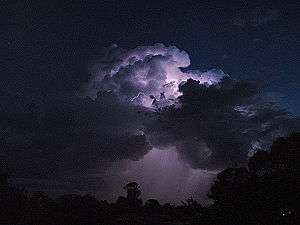Cumulonimbus calvus
| Cumulonimbus calvus | |
|---|---|
|
Cumulonimbus calvus, with probable cumulonimbus incus in background | |
| Abbreviation | Cb calv. |
| Symbol |
|
| Genus | Cumulonimbus (heap, cloud/severe rain) |
| Species | Calvus (bald) |
| Classification | Family D (Vertically developed) |
| Appearance | tall clouds with puffy rounded tops |
| Precipitation cloud? | Yes |

Cumulonimbus calvus is a moderately tall cumulonimbus cloud which is capable of precipitation, but has not yet reached the tropopause, which is the height of stratospheric stability where it forms into a cumulonimbus capillatus (fibrous-top) or cumulonimbus incus (anvil-top). Cumulonimbus calvus clouds develop from cumulus congestus, and its further development under auspicious conditions will result in cumulonimbus incus.
This cloud consists mainly of water droplets. By definition of cumulonimbus cloud, at its top water droplets are transformed into ice crystals, but for cumulonimbus calvus content of ice crystals is small and freezing is in early stage, so cloud top still looks round and puffy.
Cumulonimbus calvus is characterized by distinctive (between other types of cumulonimbus cloud) rounded shape and relatively sharp edges of its top area, unlike cumulonimbus incus or cumulonimbus capillatus, which have cirriform tops. Developing cumulonimbus calvus loses sharp outlines of the top as more water droplets transform into ice crystals. Strong updrafts may form pileus or thin vertical stripes protruding upwards out of the cloud. When upper part of the cloud freezes to greater extent and clearly visible cirriforms appears, cumulonimbus calvus turns into another species of cumulonimbus.
Cumulonimbus calvus arcus is a sub-type of cumulonimbus calvus, which has arcus cloud ahead of cloud's front.

Hazards
Like other cumulonimbus clouds, cumulonimbus calvus can cause bad weather conditions including:
- Lightning; these clouds produce lightning.
- Wind; these clouds may produce strong winds especially during a downburst
- Hail; these clouds can sometimes produce hail
- More severe storms; The Cumulonimbus Calvus can further grow larger if the updraft is strong. it can form into a cumulonimbus incus, and bring more severe storms.
| Wikimedia Commons has media related to Cumulonimbus calvus. |